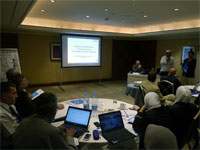 Although polio has been absent in the Middle East for 15 years, a total of 37 cases have been confirmed in Syria in the last six months.Amman, 11 May 2014 – A multi-country, multi-agency strategic planning meeting focused on limiting the transmission of wild poliovirus in the Middle East was held recently in Amman, Jordan.
Although polio has been absent in the Middle East for 15 years, a total of 37 cases have been confirmed in Syria in the last six months.Amman, 11 May 2014 – A multi-country, multi-agency strategic planning meeting focused on limiting the transmission of wild poliovirus in the Middle East was held recently in Amman, Jordan.
Led by WHO, and as part of the Global Polio Eradication Initiative, the Phase 2 outbreak response planning session brought together representatives from ministries of health of Egypt, Iran (Islamic Republic of), Iraq, Jordan, Palestine and Syria, and health professionals from WHO and UNICEF regional and country offices, Rotary International and the United States Centers for Disease Control and Prevention (CDC).
The meeting came only days before WHO’s declaration of polio spread to be a public health emergency of international concern.
Following the confirmation of polio cases in Syria and Iraq in October 2013 and January 2014, respectively, the Strategic plan for polio response in the Middle East was established with the goal of interrupting the spread of wild poliovirus in the region through mass oral vaccination campaigns targeting more than 22 million children under five. From November 2013 until now, 24 national and subnational immunization activities have been conducted in seven countries across the region, with 63 million doses of polio vaccine administered (repeat doses are required for effective immunization). The meeting in Amman centered around reviewing Phase 1 performance, evaluating interventions and examining current trends to determine next steps towards stopping polio in the region.
“Phase 2 builds on lessons learned from the initial phase of the response and looks at gaps in the system and how we can address these,” said WHO Polio Eradication and Emergency Support Manager Chris Maher.
“We have made excellent headway in stopping the transmission of polio in the Middle East, however, there is still a big risk that the outbreak will continue and that the virus will spread, so there is more we need to do to make sure that the Middle East becomes free of polio again,” he said.
Now into its fourth year, civil war in Syria continues to force large numbers of people to seek refuge in neighbouring countries. Many refugees are crossing borders having had no or only limited access to health care for months and children have missed vital routine vaccinations. Weakened by the protracted crisis, these vulnerable populations are at high risk of contracting communicable diseases, particularly when living in crowded conditions with limited access to safe water and sanitation facilities.
Through improved routine immunization coverage, repeat national immunization days, enhanced outbreak surveillance, and timely investigation and reporting of cases of acute flaccid paralysis – one of the major indicators for polio – governments in the region with the support of WHO and UNICEF are making every effort to prevent further spread of the disease.
Polio is a highly contagious and debilitating disease causing paralysis and sometimes death. Although it has been absent in the Middle East for 15 years, a total of 37 cases have been confirmed in Syria in the last six months. WHO has determined that the recent spread of wild poliovirus during what is normally the low-transmission season is an "extraordinary event" requiring a coordinated international response to prevent the situation from worsening.
According to the Office of the United Nations High Commissioner for Refugees (UNHCR) more than 2.5 million refugees have fled war-torn Syria.



